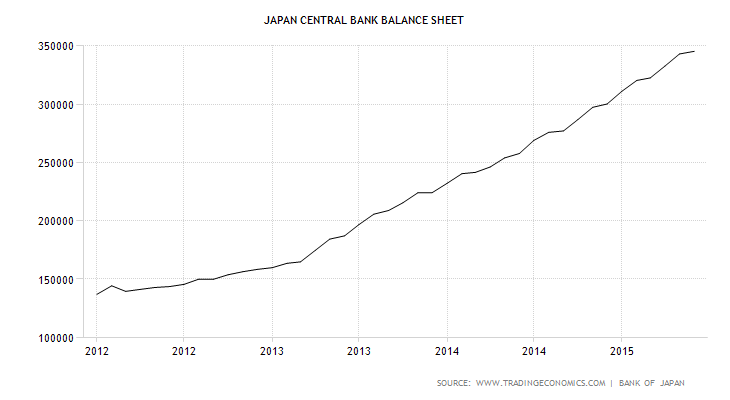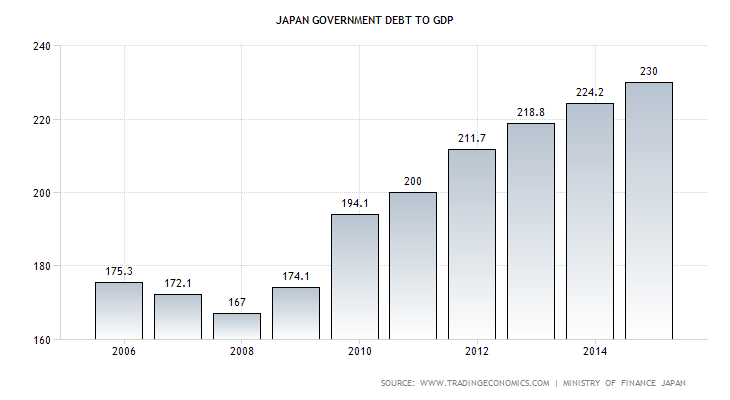Japan is facing a significant rout in its war against deflation as Quantitative Easing becomes the next failed battleground. After nearly three decades of stagnation, Japan is facing new hurdles as their monetary policy is pushed to the brink of failure.
In 2013, the Bank of Japan undertook a radical stimulus program, practically buying up every bond on the market, in a concerted attempt to inject a tremendous amount of yen into the economy. It was hoped that the injection of stimulus would dislodge the persistent stagflation and lead to new bouts of economic growth.
Unfortunately for the BoJ, stagflation persisted and the only thing that got beat was the central bank’s balance sheet which exploded at a rate even greater than that of the U.S. Federal Reserve.

The reality is that the huge stimulus package has proved futile in stimulating inflation in the wider economy. Japanese consumer prices have remained stubbornly subdued with consumer prices, excluding food, rising just 0.1% over the past year. In fact, many economists are now predicting a significant contraction throughout the current quarter.
Any contraction would subsequently vacuum up the fractional amount of inflation that the central bankers had forecast to become apparent in the latter part of 2015. At this juncture, most experts agree that the BoJ’s inflation target of 2.0% is unobtainable, at least in the medium term.
In fact, the current round of stagflation is turning decidedly nasty as household spending, follows the other economic indicators, and sheds over 2% from the prior year. Retail sales figures also mirror this trend as the latest release shows a decline of 0.8% from May. It is clear that weaker exports and diminishing domestic demand are driving a slowdown despite the huge injection of QE.
Evidence from around the world is starting to show that the Keynesian view of quantitative easing may not be enough to restart momentum in a stalled economy. The Japanese experience tends to support this view as, despite the historically record breaking stimulus, the economy still suffers from a sustained lack of inflation.
The Japanese central bank subsequently faces some difficult choices in the remainder of 2015. Admit defeat and allow the economic cycle to decline deeply and then look towards recovery or re-attempt an additional tranche of QE and face the diminishing returns that it offers. The reality is that the BoJ is very likely to inject additional funds into the economy despite some evidence that the effect upon consumer spending and inflation might be rather muted.
The other rapidly growing problem is the current Japanese Government’s debt to GDP load. After the Greek experience, many analysts have started looking towards the metric as an important indicator of sovereign risk. In plain terms, the Japanese government debt to GDP ratio is a total train wreck. The ratio currently rests at 230 which actually makes Greece’s debt load look relatively sustainable in contrast.
Given the country's current debt load and the BoJ’s increasing balance sheet, it has me wondering whether Japan will become a modern day equivalent of a mad economist’s laboratory. Considering the speed at which Japan is reaching the modern limits of debt monetization, I wonder at what point the central bank will realise that there is nothing left to buy and that they are effectively the only participant in the debt market.
At that point, which further QE might reach, the BoJ may need to intervene directly into a variety of other markets to inject liquidity. Is it even conceivable that a central bank might be active in purchasing equities or real property? There is a real risk that any such intervention might actually do more harm than good by eroding the free market price signalling mechanism.
Ultimately, Japans central bank faces the unenviable position of fighting a losing battle as the diminishing returns from QE become apparent. Whatever decision they make, one thing is for sure, the effects of Japan’s QE are likely to dominate economic research for many years to come.
